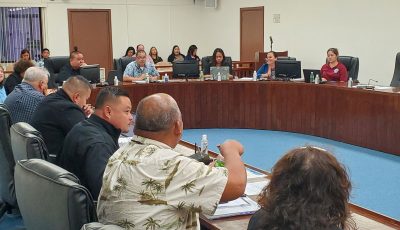PSS wants review of suspension policy
The Public School System wants to review the suspension policy and procedures of public schools for truancy cases that are referred to the School Attendance Review Committee.
This was the taken up during the PSS special board meeting last Friday after SARC coordinator Bobby L. Coldeen III reported that they currently have six truancy cases since the beginning of the school year.
“We have a couple of new referrals that brings up our total to six referrals. We continue to work with the students from last year and even previous years that has been referred. We continue to have interventions and presentations in schools,” said Coldeen.
SARC was formed in 2014 to serve as an avenue for public schools to provide intervention for juveniles and their families in addressing truancy, irregular attendance, or insubordinate or disorderly behavior in school before referral to the juvenile justice system.
Board of Education member Herman Guerrero, who asked about the policy and procedures when it comes to juvenile delinquency, said that he has been hearing concerns from the community “that there are kids that should be in school but they’re not going.”
“We would like to know who is responsible to ensure kids are going to school. …Where does the system step in to address this issue with the parents?” he added.
Coldeen said that notification and information to SARC come from the school.
“The schools turn in the student referral form and so what we really know is what we get from the schools. …So all those cases that are referred by the schools are being handled by SARC,” he said.
Education Commissioner Cynthia Deleon Guerrero said the request for intervention comes from the school and the school is very much involved.
“Once the referral is given to SARC and, throughout the request for assistance, the school remains involved in all of this. The school principal and vice principal review the disciplinary actions, talk to student and study their behavior. They reach out to our partner agencies and address these. But they also address at a school level what is in place, our policy and procedure and they implement that continuously.”
“There may be students who are suspended for a period of time and maybe others who have stopped coming to school. But the school remains involved in that entire process,” she added.
Guerrero suggested that in-school suspension—where a suspended student stays in school—is more appropriate as students are monitored and continue to do schoolwork.
“We still have our obligation to make sure these [children] are having appropriate education, whether they are in school or not. But I would like the committee to address this and look at our suspension requirements because if you just kick the [children] out, you create another problem in the community,” he added.
According to Coldeen, he is not sure how many schools implement in-school suspension, but cited Dandan Middle School as having a great in-school suspension program.
Paul Miura, teacher representative to the BOE, said he supports in-school suspension for truancy cases as it is an effective way to keep the students updated with lessons.
“We had that system at Saipan Southern High School. The students stay in cubicles and were heavily monitored by the dean of discipline. They are still in school but not in the classroom. They have access to teachers for their lessons and that was really effective in our school,” he said.
However, the person running the program has left PSS and the school experienced a huge turnover of administrative people and hasn’t re-established the program since then.
“But it’s something we have been constantly pushing. It will be better to have them on campus than to have them roaming in the communities. At SSHS it was highly effective; we had almost zero [tardy students]. The attendance rate significantly improved and the student outcome in general was better,” he added.
BOE member Florine Hofschneider said that PSS must have a strong policy and procedure in place.
“We must focus on the child’s behavior but we should never deny that child the right to education,” she said.



























